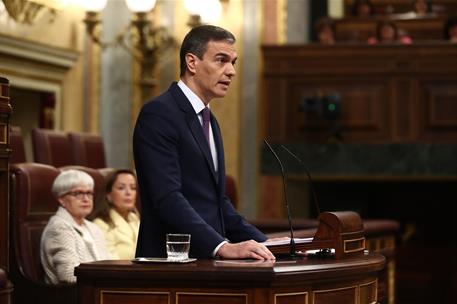Pedro Sánchez stresses that the recognition of Palestine as a state restores hope that a future of peace, security and prosperity in the Middle East is possible
President's News - 2024.5.29
Moncloa Palace, Madrid
Family photo of the meeting of the President of the Government of Spain, Pedro Sánchez, with the members of the Arab-Islamic Ministerial Committee on Gaza (Pool Moncloa/Fernando Calvo)
The meeting, at which the President of the Government was accompanied by the Minister for Foreign Affairs, European Union and Cooperation, José Manuel Albares, was attended by the prime ministers of the Palestinian Authority and Qatar, Mohamed Mustafa and Sheikh Mohammed Bin Abdulrahman Bin Jassim Al-Thani, respectively, both of whom hold the foreign portfolio, as well as the foreign ministers of Saudi Arabia, Jordan and Turkey and the Secretary General of the Organisation of Islamic Cooperation (OIC).
Pedro Sánchez expressed his satisfaction with the meeting, in which Spain's commitment and willingness to work together with the Arab countries in their efforts to put an end to the violence and bring about a two-state solution was notable.
The President of the Government told the members of the Ministerial Committee that Spain has taken the decision to recognise the State of Palestine to contribute to the achievement of peace, the search for justice and the defence of an international rules-based order.
All the participants in the meeting thanked President Sánchez for the historic and courageous step that recognising the State of Palestine represents at this time, stressing that it is not just a symbolic step, but one that keeps the idea of two states alive. In this regard, the Prime Minister of the Palestinian Authority, Mohamed Mustafa, underlined that Spain's decision, together with those of Ireland and Norway, lays the foundations for a new beginning for the region.
During the meeting, all parties agreed on the need for Arabs, Europeans and the entire international community to work together to try to move forward, committed to the parties involved, sharing the view that the only viable path to peace is to implement the two-state solution.
The president emphasised the urgency of ending the humanitarian crisis and stressed that recent images from Gaza are extremely worrying and that the situation continues to worsen.
Pedro Sánchez also reiterated the need to halt the military operation in Rafah and to establish a permanent ceasefire, for Hamas to release all hostages and for Israel to allow humanitarian access to Gaza on a large scale, in accordance with the order issued by the International Court of Justice.
In this context, the President of the Government defended the need to continue working on a political solution, which involves seeing this recognition as an active contribution to achieving peace and encouraging the states that have not recognised Palestine or Israel to begin a process to do so without delay, as well as supporting Palestine's accession as a full member of the UN. It also involves supporting the Palestinian National Authority in the reform process initiated by its new government, and the promotion of a political project among all of us for when the conflict ends.
Arab-Islamic Ministerial Committee on Gaza
The President of the Government of Spain, Pedro Sánchez, holds a meeting with the members of the Arab-Islamic Ministerial Committee on Gaza, at the Moncloa Palace | Pool Moncloa/Fernando Calvo
The Arab-Islamic Ministerial Committee on Gaza or the "Gaza Contact Group" was established in November, following the joint Arab League-IOC summit in Riyadh, with the aims of achieving a ceasefire, the delivery of humanitarian aid and the establishment of an action plan for the realisation of the two-state solution.
It is made up of the foreign ministers of Saudi Arabia, the Palestinian Authority, Egypt, Jordan, Qatar, Turkey, Indonesia, Nigeria and the secretaries general of the Arab League and the Organisation of Islamic Cooperation.
Non official translation





